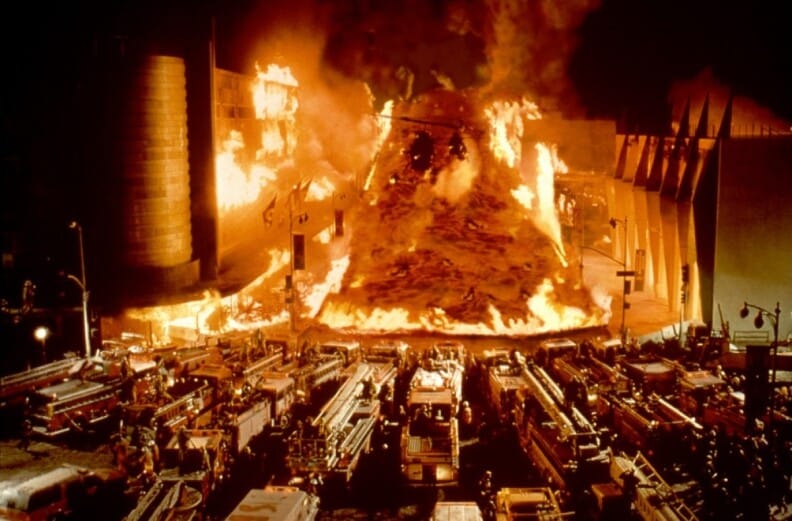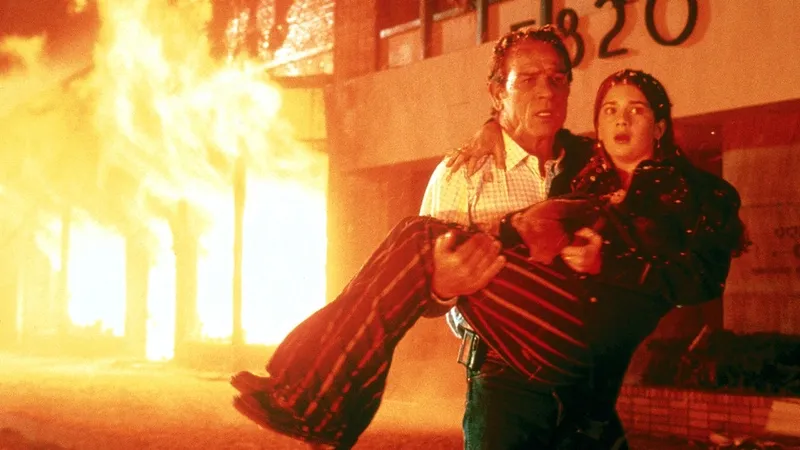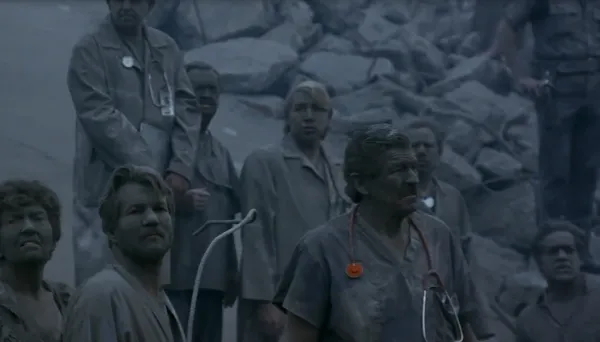Cities in Dust: Volcano (Mick Jackson, 1997)
There's only one race: The race to avoid being melted by a volcano.

In October of 1987, when I was five years old and living in Ohio, a 5.9 earthquake hit the city of Los Angeles. The story was on the news for what felt like weeks. There were infographics showing how California was constructed on top of seismic fault lines, and explanations of the Richter scale, and talk about the “Big One” that could send the whole state tumbling into the ocean.
What I really remember are the interviews with the survivors. One woman told a story I’ve never forgotten, though it featured in so many childhood nightmares that I may have elaborated on it over the years. She was walking out of her car after the quake, she said, and when she looked down, she saw someone’s brain lying on the sidewalk. It was intact, and quivering, and the person it belonged to was nowhere to be found.
That was my first exposure to disaster — the fact that the Earth was fundamentally unsafe and unpredictable, and that nature could turn on you and rip you apart. I have always been afraid of earthquakes, because of that October, though I know people for whom they are common and only mildly annoying. A friend from California once told me that he was terrified of tornadoes; in Ohio, we used to get them every summer. When I was in Naples, near the ruins of Pompeii, my guide pointed out Vesuvius and told me people were still living on the mountainside: If it blows up, it blows up, she said. We all make our peace with the violently unstable planet we live on, if only because we have nowhere else to go.
Deep down, though, I think we all know that it could blow at any second. Everything we’ve built is small, and fragile, and one bad piece of luck could wipe it out. It’s not a noble impulse, gaping at catastrophe — the person whose brain was on that sidewalk was a person, had a family and friends and dreams of being remembered as something other than a particularly horrifying news story — but it is common. Hence, the disaster movie: Because, as Michael Caine warned us, some men just want to watch the world burn.
Welcome to the Halloween Special! Regular subscriptions are, as always, 20% off this month.
I've also introduced a new "Friend of the Blog" tier, which (at $9 a month and $99 for the year) is more expensive, but helps me to keep writing this newsletter without selling my plasma. If you'd like to support my work, and you have the cash, I'd appreciate your upgrade.
Volcano — a movie which begins with a massive earthquake rocking the city of Los Angeles, though by no means does it stop there — came in at the peak of the late-1990s disaster wave. Roland Emmerich’s Independence Day had kicked it off by pornographically exploding several major cities, and Twister solidified the trend. By the end of the decade, the genre was so thickly populated that disaster movies came in pairs: Armageddon and Deep Impact, both about a comet hitting Earth, came out in 1998, and Volcano and Dante’s Peak came out within eight weeks of each other in 1997.
I watched Dante’s Peak in 10th-grade geology class. Pierce Brosnan managed to escape most of the volcanic events whilst rather slowly driving a van through small-town Oregon, and I remember thinking that volcanoes couldn’t be that scary if you could outrun them at 35 miles per hour. So I never actually watched Volcano, until recently, and I am surprised and delighted to find it an archetypal example of the form.
Disaster movies have rules. They have requirements. One, the disaster cannot be supernatural. Godzilla destroys at least one major metropolis in each of his movies, but it’s not a disaster movie; it’s a Godzilla movie, because Godzilla’s in it. Two, the movie is not truly about disasters, but about the human response to disaster, and how society manages to preserve itself through (very literal) upheavals. Volcanoes and comets and earthquakes and tornadoes tear society apart; people put it back together. We come to see the destruction, but we applaud the repair.
Third: Disaster movies are always always always about the preservation of The Nuclear Family. Just as the erotic thriller is obsessed with potential or actual threats to straight coupledom, the disaster movie has an unending boner for heterosexual nuclear father-led families, and imperils them so that we can cheer when they come back together at the happy ending. You would be amazed how many distracted, work-obsessed Dads prioritize their work over spending time with their children, only to be rewarded with a swift volcano to the face.

In Volcano, the Dad who must repent is Tommy Lee Jones, and he heads up one of those big, beefy ‘90s disaster-movie cast lists that looks like this:
- Tommy Lee Jones!
- Anne Heche!
- A dog!
- Tia Carrere!
- Don Cheadle!
- Another dog!
- Naomi Campbell!
- Gabby Hoffman!
- Sun-dried tomatoes!
- The lady who played Michael Douglas’s assistant in Disclosure!
- Sinbad!
- John Carroll Lynch, not playing a serial killer!
- The Los Angeles subway system!
- John Corbett, not playing a Dad and/or romantic lead!
- Marcia Clark!
- The LaBrea tar pits!
- Carrot Top!
- The moon!
- Keith David!
Some of those are made up — but, crucially, not all of them are, and you can’t tell which by guessing.
Aside from being a distracted, work-obsessed Dad — for which he will be punished with the full wrath of the Earth and its seismic forces — Tommy Lee Jones is the director of Los Angeles’ Office of Emergency Management; a man who is granted titanic, near-Godlike powers over the entire city of Los Angeles, should it ever be struck by a natural emergency, which (wouldn’t you know it?) is exactly what happens in this movie. The apparent emergency is a volcano which erupts up through the sidewalk. The real emergency (Volcano says, forsaking all subtlety) is racism, which threatens to erupt in the streets of Los Angeles every minute.
The Los Angeles of Volcano is probably intended to evoke the 1987 earthquake, but even more pointedly, it’s meant to evoke the 1992 Rodney King beating and subsequent riots, and the 1995 O.J. Simpson trials, which brought their own revelations about white supremacy in the Los Angeles police department, thanks to the involvement of Nazi-worshipping and evidence-planting cop Mark Fuhrman. Plenty of Americans had seen televised images of Los Angeles in flames, in the recent past; Volcano was just offering a bigger, more spectacular version of the damage.
It was also offering them a fantasy that the damage could be repaired by a white guy within 104 minutes. Tommy Lee Jones, obviously, is the white guy (whose second-in-command is pointedly played by a Black actor, and — even more pointedly — made to remark that he is not as good at his job as Tommy Lee Jones) because in 1997, we trusted Tommy Lee Jones to do most things. In the face of an impersonal threat like a volcano, Volcano suggests, humanity will forget their differences. White supremacist cops and Black teenagers will work together on the front lines. No-one can see race when they’re blinded by volcanic ash, and this is not just a metaphor, but a thing that literally happens.

Need I mention that, at some point in the movie, Tommy Lee Jones is separated from his daughter, Gaby Hoffman? Need I further mention that Tommy Lee Jones restores the nuclear family unit by literally outrunning a collapsing skyscraper with his daughter in his arms? I need not. Like the iambic pentameter of a sonnet, the disaster movie has its traditional rhythms, and Volcano respects the form.
Nor shall I mention much of the other stuff that goes on in Volcano, which is — I assure you — silly. For instance, John Carroll Lynch (playing the Los Angeles subway czar, with all the lordly dignity that position is owed) is given a death that suggests the makers of Volcano didn’t actually know how lava worked, and thought it was some kind of inter-dimensional portal, so that John Carroll Lynch slowly disappears through its inch-deep surface, waving his arms and making surprised faces all the while. Anne Heche plays a spunky geologist who regrettably drops her co-geologist Rachel into the volcano, and then, three seconds later, seeing the volcano, says “oh, Rachel, you would have loved this!” We all saw how Rachel reacted to the volcano, Anne Heche! She fell in there! She obviously did not love it at all!
Is this a tasteful representation of a city that had very recently been wracked with real-life tragedy and catastrophe? No. But in the summer of 1997, Los Angeles was not just a city; it was The City, the place where the social contract was forged and tested, where the American experiment came to a head and maybe to a halt. Volcano more than hints that Los Angeles deserves its fiery expiation; sometimes (as when a crew of workmen discusses Hieronymus Bosch) it hints that L.A. might be Hell, or maybe just that it deserves to go there. I’m told that the movie is unusually faithful to the geography and look of mid-90s Los Angeles, and there is palpable glee taken in setting its landmarks on fire. The City scared people, especially people who didn’t live there, and they paid good money to see it put to the torch.
But the fire is set so that it can be put out. The nuclear family is separated so that it can be reunited. The people of Los Angeles are divided by racism, but only so that they can come together in the service of some greater goal, like not getting melted by a volcano. This was the mid-1990s, when America earnestly believed you could solve any problem in 104 minutes by throwing Tommy Lee Jones at it, and if the filmmakers had any idea that the fractures and fault lines of American life ran deeper, that the divisions would be aggravated with the passing years, that all these problems would recur and recur again and get worse with each iteration — the volcano in Volcano is still active when the credits roll — it’s buried under a thick, comforting layer of volcanic ash.
They all look the same, a little boy says, looking at the ash-blanketed survivors. They don’t just look the same. They look white. That’s how white people want things to look, which is the problem.
Volcano is streaming on Hulu and Disney Plus.
At my other job: Speaking of disasters, if you, too, are stressed out about the upcoming election (and most trans people are) here's how to make it through.
Is the song in your head? It's stuck in my head now.